Understanding the Tax Implications of Autism-Related Support
Funding and benefits for autism can significantly impact families, not only in terms of coverage but also in how they are taxed. This comprehensive guide explores what is taxable, how to manage deductions, credits, and special accounts, and offers strategies to optimize financial planning when supporting a loved one with autism.
Taxability of Autism Funding Sources
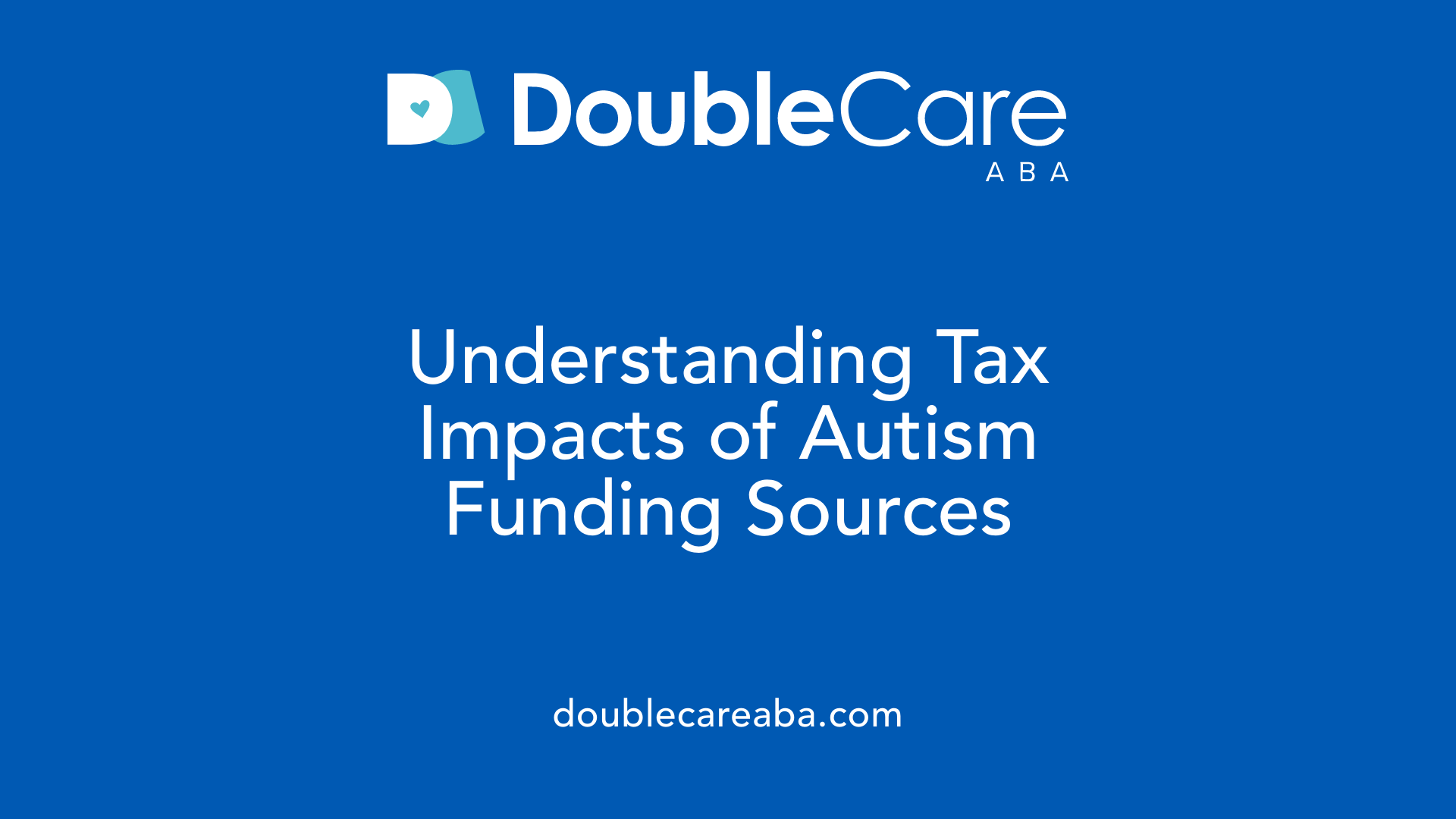
Is funding for autism support taxable?
Funding and resources allocated for autism support can come from various sources, and their tax implications differ. Grants and funding directed specifically toward treatment, therapies, specialized equipment, or medical procedures are usually not considered taxable income. These can often be claimed as deductions if they qualify as medical expenses under IRS rules, provided there is proper documentation and they are prescribed by a healthcare provider.
For example, expenses related to special diets, therapy sessions, home modifications, and transportation to medical appointments often qualify as deductible medical expenses if they exceed certain thresholds of adjusted gross income (7.5% or 10% depending on the expense type). These expenses can include medical supplies, assistive devices, or modifications to a home necessary for medical reasons.
Certain disability benefits, such as the Disability Tax Credit (DTC), and government-supported programs like Social Security Disability Insurance (SSDI) and Supplemental Security Income (SSI), tend to be tax-exempt because they are need-based benefits aimed at supporting individuals with disabilities. However, some other benefits, such as SSDI in specific circumstances, or earnings from work, may be taxable.
It’s crucial to understand that if funding is treated as income, it could impact eligibility for certain tax credits, such as the Earned Income Tax Credit (EITC). Additionally, payments received from retirement plans or IRAs before age 59½ might be subject to penalties unless they qualify for exceptions, like being disabled.
Given the complexity of tax laws and the diversity of funding sources, consulting IRS guidelines and a tax professional is advisable. Reviewing specific details and classifications ensures proper tax reporting and maximizes available benefits.
For more detailed understanding, search for: "Taxability of autism disability funding IRS guidelines."
This overview highlights how different sources of autism-related funding can impact your taxes, emphasizing the importance of proper documentation and understanding IRS rules.
Tax Implications of Autism-Related Benefits and Expenses
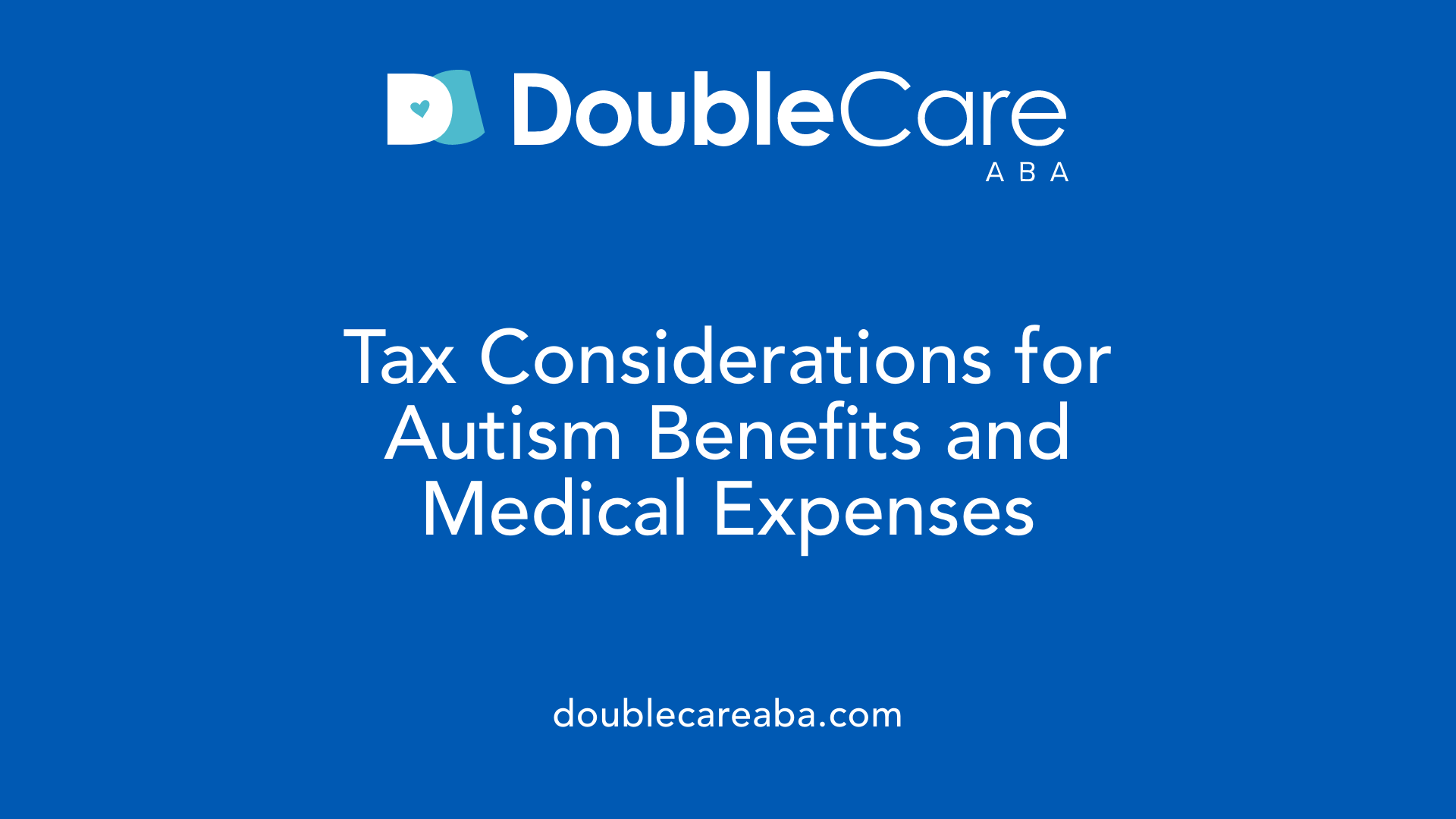
What are the tax implications of receiving autism-related benefits and funding?
Understanding the tax implications of autism-related benefits and expenses is crucial for families managing such support. Social Security benefits like SSDI (Social Security Disability Insurance) are typically tax-exempt, meaning they usually do not count as taxable income. However, if recipients have additional income, a portion of SSDI benefits may become taxable under certain circumstances. Conversely, SSI (Supplemental Security Income) is generally not taxable because it is need-based and designed to assist with basic living expenses.
Families often incur various medical expenses related to autism, such as therapy, specialized schooling, and diagnostic evaluations. These costs can usually be deducted on federal tax returns if they exceed 7.5% of the family's Adjusted Gross Income (AGI). Eligible expenses include specialized treatments, assistive devices, travel for medical care, and home modifications needed due to a child's disability. Proper documentation and adherence to IRS guidelines are essential for claiming these deductions.
Claiming a dependent with autism can also influence tax benefits. An autistic child considered disabled by IRS standards can often be claimed as a dependent regardless of age, potentially increasing standard deductions and qualifying for credits like the Child Tax Credit or the Earned Income Tax Credit (EITC). Importantly, families should review IRS publications such as Publication 502 and 525 to understand what qualifies as deductible expenses and how to report them properly.
In addition, various programs and benefits, including ABLE accounts, Medicaid waivers, and vocational supports, offer financial assistance that can impact taxable income and deductions. For example, ABLE accounts allow funds to grow tax-free and be withdrawn tax-free when used for qualified disability expenses. However, the details of taxation and reporting vary depending on the benefit type.
Overall, families involved in managing autism-related benefits and expenses should consult IRS resources or a tax professional to navigate the complex rules. Identifying which benefits are taxable, which expenses qualify for deductions, and how to document and report these items accurately can lead to significant tax savings and financial support.
| Benefit/Expense Type | Tax Status | Relevant IRS Publications | Notes |
|---|---|---|---|
| SSDI (disability benefits) | Usually non-taxable | IRS Publication 915 | May be taxable if combined income exceeds threshold |
| SSI (need-based benefit) | Not taxable | N/A | Designed to provide basic financial support |
| Autism therapy and treatments | Deductible if exceeding 7.5% of AGI | IRS Publication 502 | Requires proper documentation |
| Home modifications | Deductible as medical expenses | IRS Publication 502 | Only if necessary for medical reasons |
| Reimbursements/insurance | May reduce deductions | IRS Publication 502 | Must adjust claims based on reimbursements |
| ABLE accounts | Tax-free growth & withdrawals | IRS Publication 907 | Must be used for qualified expenses |
This overview highlights the importance of understanding the specific tax rules and leveraging available benefits. Correctly managing these aspects can ease financial burdens and maximize support for individuals with autism.
Disability-Related Funds and Their Tax Status
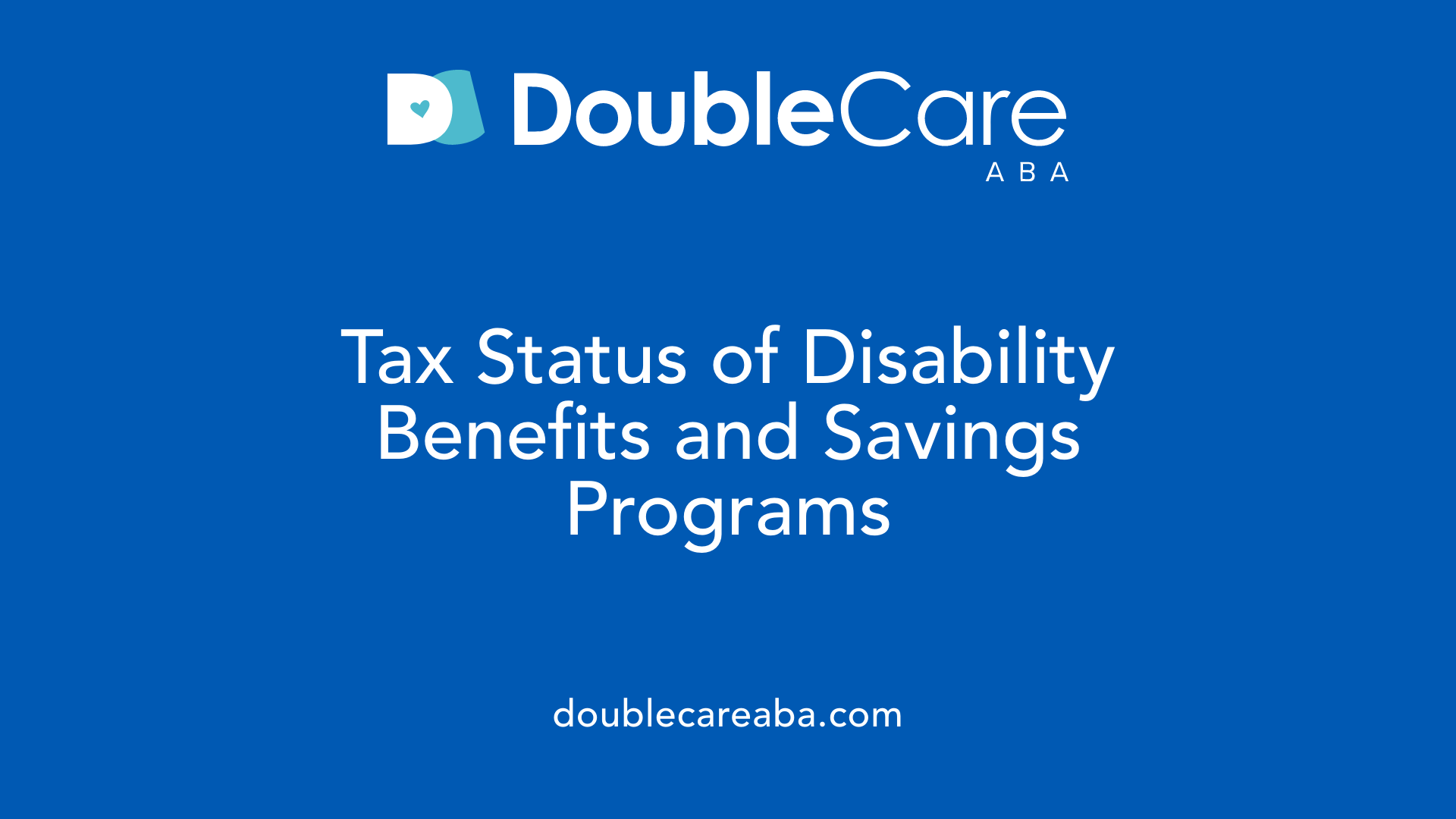
How are disability-related funds and benefits taxed?
Most benefits associated with disabilities are designed to be tax-advantaged to support individuals with special needs. For instance, benefits received from programs such as the Department of Veterans Affairs (VA), workers' compensation, and Supplemental Security Income (SSI) are typically exempt from income tax. These funds are intended to provide financial relief without creating tax liabilities.
However, some disability payments may be taxable under certain conditions. Disability pensions paid by employers or military disability pensions might be taxable unless they qualify for specific exclusions. For example, military disability pay might be tax-free if it comes from a service-connected disability.
Private disability insurance benefits can also differ in taxability. If benefits are paid through an employer-sponsored plan funded with pre-tax premiums, the payments are usually taxable. Conversely, if an individual pays premiums with after-tax dollars, the benefits are generally tax-free.
A significant tax advantage exists with ABLE accounts (Achieving a Better Life Experience). Distributions used for qualified disability expenses—such as education, housing, transportation, and medical care—are tax-free, and the accounts themselves grow tax-deferred. Contributions to ABLE accounts are subject to annual limits ($17,000 for 2024), and the funds can be used without affecting Medicaid eligibility if kept below $100,000.
Additionally, individuals with disabilities may access various tax credits and deductions, such as the Child Tax Credit, Earned Income Tax Credit, and deductions for medical expenses exceeding certain percentages of their Adjusted Gross Income (AGI). These benefits aim to reduce tax burdens and enhance financial stability.
Understanding the specific tax treatment of each benefit requires consulting IRS publications and guidelines. These resources clarify whether particular benefits or income sources are taxable, ensuring compliance and optimal tax planning for families dealing with autism or other disabilities.
For further details, refer to the IRS's official guidance on the "Tax treatment of disability benefits."
Tax Credits and Deductions for Autism and Disabilities
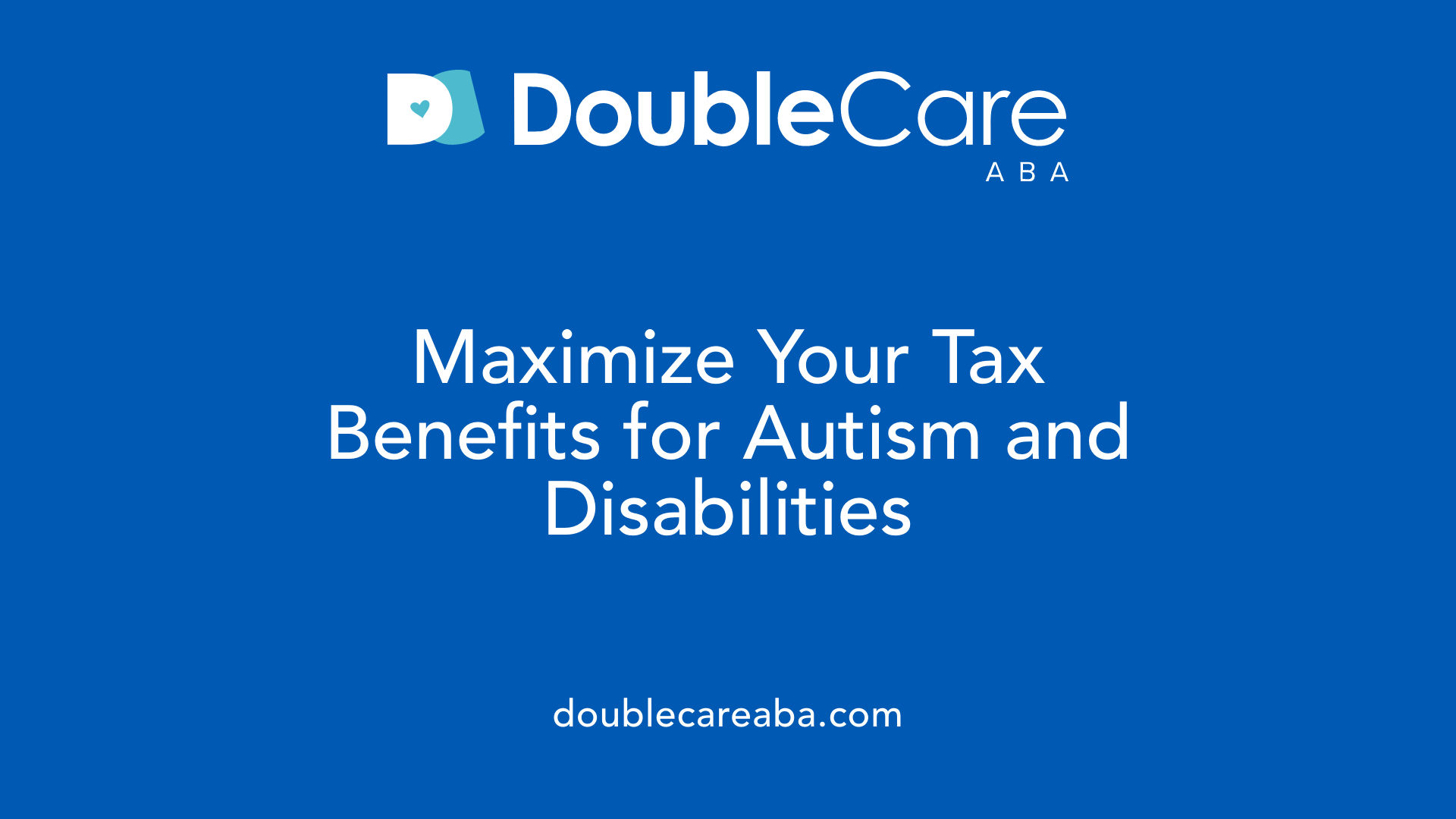
What medical expenses related to autism or other special needs are deductible?
Families dealing with autism or similar conditions may qualify for deductions on a variety of medical expenses. This includes costs for therapy, diagnostic evaluations, genetic testing, and specialized equipment necessary for medical care. Expenses such as special diets prescribed by a doctor, if they surpass normal diet costs and are properly documented, are also deductible. Travel expenses for treatment or therapy appointments—such as mileage, lodging, and transportation—may be claimed, especially when distance or timing makes frequent visits necessary.
Home modifications needed to accommodate a child's disability, like installing lifts or removing structural barriers, can be deductible if they are medically necessary and do not significantly increase property value. Costs for attending medical conferences related to a child's condition, when recommended by a healthcare provider, can be claimed, excluding lodging and meals. Medical expenses for long-term care facilities or nursing homes are deductible if primarily for healthcare purposes.
What tax credits, deductions, or strategies are available for autism and disability funding?
Parents and individuals with disabilities have access to several credits and strategies to offset the financial burden of care. The Child Tax Credit, which for 2024 offers up to $2,000 per qualifying child, can help families with eligible children. The Earned Income Tax Credit (EITC) is available for families with a child considered permanently and totally disabled under IRS rules, potentially providing a significant refund if income limits are met.
Special savings accounts such as ABLE (Achieving a Better Life Experience) accounts offer tax-advantaged growth, allowing up to $17,000 in contributions annually with funds used for qualified disability expenses. For those paying for certain home modifications, the Barrier Removal Tax Deduction provides up to $15,000 annually for approved expenses. Additionally, families can benefit from the Child and Dependent Care Credit if paying for caregivers or specialized care services.
Legal expenses related to obtaining or enforcing medical care plans or services, as well as costs for special schooling or legal advocacy, may be deductible under certain circumstances. It’s advisable to consult IRS publications like Publication 501 and 502 for detailed guidance.
More about funding programs and planning
Beyond deductions and credits, various government programs offer support. Medicaid waivers (such as HCS, STAR Kids, and MDCP) provide coverage for therapies and services. Social Security benefits, including SSDI and SSI, can supply essential income and assistance, with ABLE accounts designed to supplement these benefits through tax-free savings.
Families should explore multiple avenues, including applying for waivers, benefits, and savings plans, to maximize support. Proper planning ensures that expenses like home modifications, medical devices, or specialized education are efficiently funded, reducing financial stress.
| Funding Type | Description | Eligibility & Notes |
|---|---|---|
| Medicaid Waivers | Offer medical and support services | Income-based, vary by state |
| SSDI & SSI | Social Security benefits | SSDI taxable in some cases; SSI generally not |
| ABLE Accounts | Tax-free savings for disabilities | Up to $17,000/year in contributions |
| Child & Dependent Care Credit | Care expenses for eligible children | Income limits apply |
| Child Tax Credit | Up to $2,000 per child | Income limits and eligibility criteria |
| Legal & Medical Expense Deduction | Certain legal fees and medical costs | Must exceed specified AGI thresholds |
| Home Modifications Deduction | Structural changes for therapy | Must be necessary and medically justified |
This comprehensive approach helps families leverage available benefits efficiently, supporting the health, education, and well-being of individuals with autism and other disabilities.
Funding Sources and Their Tax Considerations
What are the tax considerations for funding sources like Medicaid, Social Security, waivers, and ABLE accounts?
Funding options such as Medicaid, Social Security, waivers, and ABLE accounts each come with their own tax rules and implications. Knowing these specifics is crucial for families managing autism-related expenses and benefits.
ABLE accounts are designed as tax-advantaged savings tools for individuals with disabilities, including autism. Contributions to ABLE accounts must stay within the annual limit, which is $17,000 for 2024. The funds in these accounts grow tax-free, and withdrawals used for qualified disability expenses are also tax-free. However, if the account balance exceeds $100,000, it could affect Medicaid eligibility, especially for those relying on Medicaid waivers.
Regarding Social Security, benefits under SSDI can be taxable if the recipient’s total income is above a certain threshold, while SSI benefits are generally not taxed because they are need-based. Medical and disability-related expenses paid through these programs often do not count as taxable income, but some benefits might be partially taxed depending on income levels.
Medicaid benefits for long-term care or specific medical services are typically not taxed directly. However, Medicaid's payback rule applies to funds remaining in an ABLE account after the account holder's death. The state can recover costs from the estate, which may impact inheritance planning.
The importance of understanding these rules lies in effective financial and tax planning. Properly managing contributions, withdrawals, and reimbursements ensures compliance and optimizes benefits provided by each program.
| Funding Source | Tax Implication | Contribution Limit | Additional Details |
|---|---|---|---|
| ABLE Accounts | Tax-free growth & withdrawals | $17,000/year | Excess balances may affect SSI benefits; funds grow tax-free |
| Social Security (SSDI) | Partially taxable if income is high | N/A | Benefits may be taxable depending on income; some are excluded from gross income |
| SSI | Generally not taxable | N/A | Based on need; benefits are not taxed |
| Medicaid | Not taxed directly | N/A | Benefits for medical care; payback rule applies for ABLE accounts post-death |
Resources for Further Information
For detailed guidance, families are encouraged to review IRS publications and consult with tax professionals regarding Medicaid, SSI, and ABLE account rules. Efficient planning can help maximize benefits while maintaining compliance.
Filing Requirements and Tax Reporting for Autism Benefits
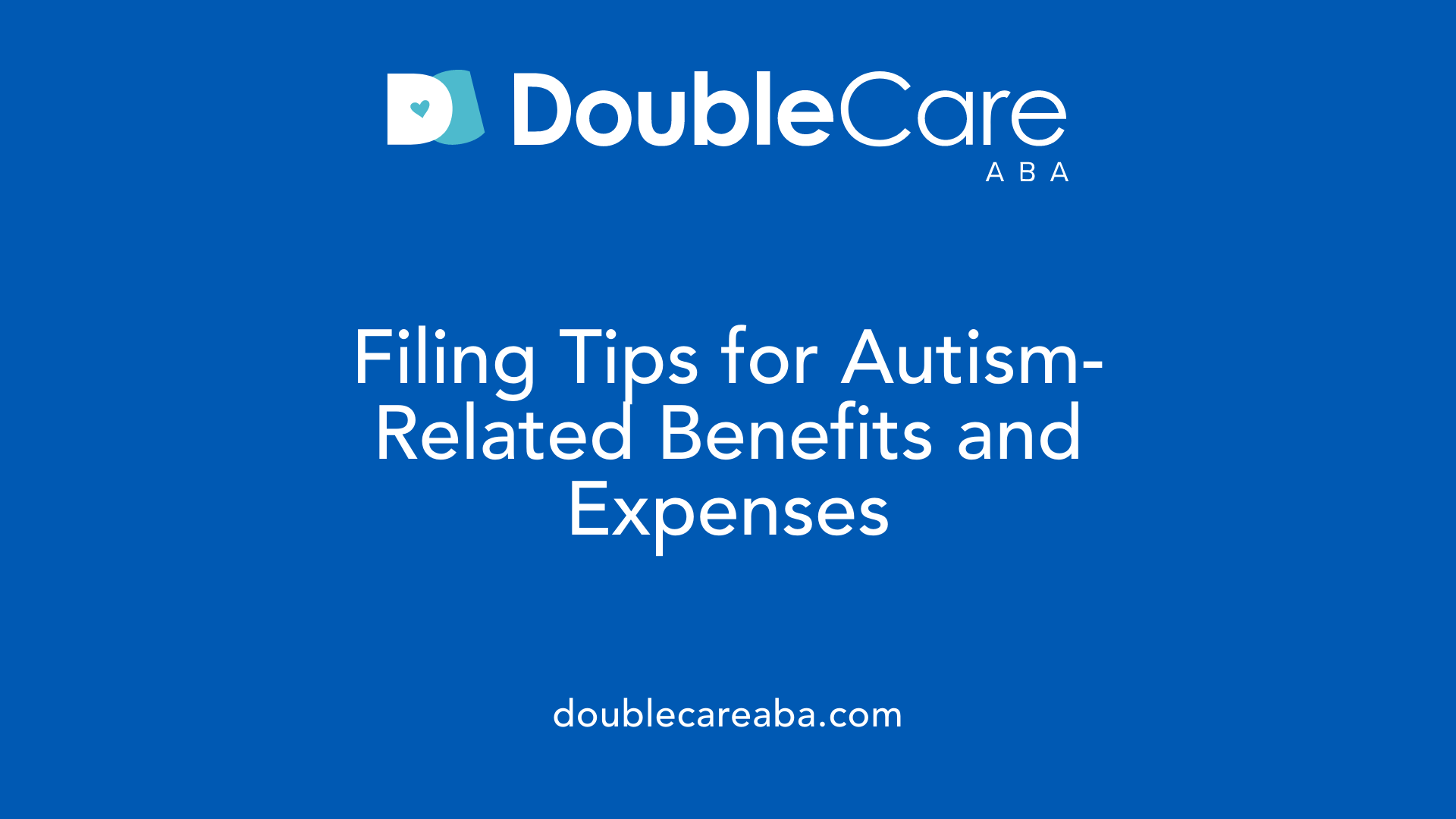
Are autism-related benefits and income taxable, and what are the filing requirements?
Autism-related benefits and incomes have different tax implications, depending on their source and purpose. For instance, Social Security Disability Insurance (SSDI) is often considered taxable if the recipient’s combined income exceeds IRS thresholds. Conversely, Supplemental Security Income (SSI) is generally not taxed and does not need to be reported as taxable income.
Some forms of disability benefits, such as those received from employment or state vocational rehabilitation programs, are treated as earned income. These can qualify for credits like the Earned Income Tax Credit (EITC), which benefits low-to-moderate income families.
Medical expenses related to autism—including therapy sessions, special educational programs, adaptive equipment, and home modifications—may be deductible if they are unreimbursed and surpass 7.5% of the Adjusted Gross Income (AGI). Keeping detailed records and documentation, including doctors' letters and receipts, is essential.
It is crucial for taxpayers to review IRS rules carefully and consult a tax professional to understand how their specific autism benefits and expenses should be reported. Proper filing ensures they maximize potential credits and deductions while maintaining compliance with tax laws.
How do I report autism-related expenses and credits?
When filing taxes, individuals should itemize their eligible medical expenses using Schedule A, if they exceed the 7.5% AGI threshold. Including costs for therapy, special schooling, transportation, and necessary home modifications ensures these expenses are considered.
For claiming credits, such as the Child Tax Credit or the Child and Dependent Care Credit, families need to provide relevant documentation and dependents’ eligibility proof. Autism-affected children classified as disabled under IRS definitions can be claimed as dependents, enhancing access to tax benefits.
It is also important to report any reimbursements received from insurance, schools, or government programs, as these can reduce deductible expenses or affect taxable income.
What are the reporting requirements for government aid and savings programs?
Programs like Medicaid waivers, Supplemental Security Income (SSI), and Social Security Disability Insurance (SSDI) have specific reporting protocols. Recipients should report all benefits received and ensure compliance with income limits to maintain eligibility.
Savings accounts such as ABLE plans are tax-advantaged, allowing funds to grow tax-free and be withdrawn tax-free for qualified expenses. Contributions up to $17,000 annually for 2024 can be made without impacting Medicaid eligibility, and these contributions should be properly documented.
Fund distributions from these accounts do not need to be reported as income if used for qualified expenses, but keeping thorough records is vital. Additionally, any payments for autism treatments, therapies, or accommodations paid through government benefits should be included in tax filings with supporting documentation.
For detailed guidance on claiming and reporting these programs, consult IRS resources and consider professional tax advice, especially to navigate complex rules and ensure proper compliance.
Maximizing Benefits and Complying with Tax Laws
Navigating the tax landscape related to autism funding can be complex, but understanding what is taxable, what can be deducted, and how to leverage available credits and accounts is essential for financial health. Consulting IRS publications and a tax professional will help families optimize their resources while staying compliant. Proper planning ensures that autism-related expenses support both the well-being of the individual and the financial stability of the family.
References
- Tax Strategies for Parents of Kids with Special Needs
- Autism & Taxes: Unlocking Tax Benefits for Families (2024) - XOA TAX
- Tax Strategies for Special Needs Families
- Tax benefits for businesses who have employees with disabilities - IRS
- Medicaid for Autism: Funding Tips for Parents
- What Autism-Related Benefits and Taxes can I Claim? - AutismBC
- Tax Strategies for Parents of Kids with Special Needs
- Tax Tips for Parents of a Child with Special Needs
- More information for people with disabilities | Internal Revenue Service















